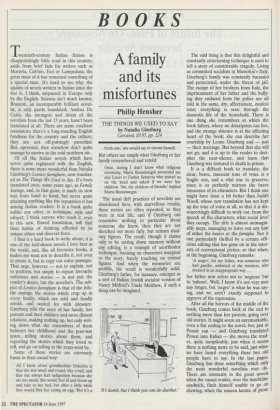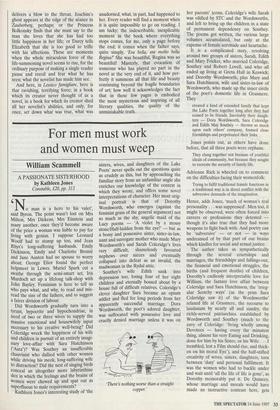BOOKS
A family and its misfortunes
Philip Hensher
THE THINGS WE USED TO SAY by Natalia Ginzburg Carcanet, £9.95, pp. 224
disappointingly little read in this country; aside from brief fads for writers such as Moravia, Calvino, Eco or Lampedusa, the great mass of it has remained something of a special taste. It's hard to see why; the quality of novels written in Italian since the war is, I think, surpassed in Europe only by the English. Sciascia isn't much known; Brancati, an incomparably brilliant novel- ist, is only partly translated; Andrea De Carlo, the strongest and driest of the novelists from the last 15 years, hasn't been translated at all. There are some excellent translators; there's a long-standing English fondness for the country and the culture; they are not off-puttingly parochial. But, uprooted, they somehow don't quite manage to survive in the cold northern air.
Of all the Italian novels which have never quite registered with the English, there is none more wonderful than Natalia Ginzburg's Lessico famigliare, now translat- ed as The Things We Used to Say. It's been translated once, some years ago, as Family Sayings, and, in that guise, it made its slow way from hand to hand, but never quite attaining anything like the reputation it has among Italian readers. It is a book quite unlike any other, in technique, style and subject; I think anyone who reads it, even in this new, flawed translation, will find their habits of thinking affected by its unique allure and discreet force.
I find it a hard book to write about; it is one of the half-dozen novels I love best in the world, and, like all favourite books, it makes me want not to describe it, not even to praise it, but to copy out some passages. That urge, however — not to explain, not to perform, but simply to repeat favourite sentences and stories — is not just the reader's desire, but the novelist's. The sub- ject of Lessico famigliare is that of the title: the sayings, the stories which crop up in every family, which are told and fondly retold, and waited for with pleasure. Ginzburg tells the story of her family, her parents and their children and more distant relations, making nothing up, but only writ- ing down what she remembers of them between her childhood and the post-war years; telling stories about them, and reporting the stories which they loved to tell, and go on telling as the years went by. Some of these stories are extremely funny in their casual way:
All I know about grandmother Dolcetta is that she was small and round, like a ball, and that she always had indigestion because she ate too much. She would feel ill and throw up and take to her bed, but after a little while they would find her eating an egg. 'But it's a fresh one,' she would say to excuse herself.
But others are simply what Ginzburg or her family remembered and retold:
Once, during I don't know what religious ceremony, Maria Buoninsegni presented me and Lucio to Father Semeria who patted us on the head and asked if we were her children. 'No, the children of friends,' replied Maria Buoninsegni.
The usual deft practices of novelists are abandoned here, with marvellous results; these stories are often repeated, as they were in real life, and if Ginzburg can remember nothing in particular about someone she knew, then they are not sketched out more fully, but remain shad- owy figures. The result, though it claims only to be setting down memory without any editing, is a triumph of unorthodox technique, focusing on characters marginal to the story, barely touching on central figures. And when the memories are prolific, the result is wonderfully solid. Ginzburg's father, for instance, emerges as a sort of Italian Jewish socialist version of Nancy Mitford's Uncle Matthew, if such a thing can be imagined.
Its dumb, but I think you can do dumber.' The odd thing is that this delightful and constantly entertaining technique is used to tell a story of considerable tragedy. Living as committed socialists in Mussolini's Italy, Ginzburg's family was constantly harassed and persecuted, under the threat of jail. The escape of her brothers from Italy, the imprisonment of her father and the bully- ing they endured from the police are all told in the same, dry, affectionate, modest tone; everything is seen through the domestic life of the household. There is one thing she remembers at which the book falters, where no description can live, and the strange absence is at the affecting heart of the book; she can describe her courtship by Leone Ginzburg and — just — their marriage. But beyond that she will not go, and it is up to the reader to deci- pher the near-silence, and learn that Ginzburg was tortured to death in prison.
It is a difficult book to translate; the clear, brave, innocent tone of voice is a fragile one, and a vital one to preserve, since it so perfectly mirrors the brave innocence of its characters. But I think one might have done a bit better than Judith Woolf, whose new translation has not kept up the tone of voice at all, so that it is dis- concertingly difficult to work out, from the speech of the characters, what social level they occupy. The title is almost unimagin- ably inept, managing to leave out any hint of either the lessico or the famiglia. Nor is one particularly thrilled by a certain offi- cious editing that has gone on in the inter- ests of conventional pieties, so that when, at the beginning, Ginzburg remarks:
'A negro', for my father, was someone who had gauche, awkward or shy manners, who dressed in an inappropriate way .
her father now refers not to `negroes' but to 'yahoos'. Well, I know it's not very nice any longer, but 'negro' is what he was say- ing, and we aren't exactly supposed to approve of the expression.
After all the horrors of the middle of the book, Ginzburg comes back at the end to nothing more than her parents, going over old stories. It might seem an unremarkable, even a flat ending to the novel, but, just as Proust can — and Ginzburg translated Proust into Italian — she moves the read- er, quite inexplicably, just when it seems there is nothing more to be said, just when we have heard everything these two old people have to say. In the last pages, Ginzburg has done something which only the most wonderful novelists ever do. There are moments in the great novels when the casual reader, over the lunchtime sandwich, finds himself unable to go on chewing; when the unseen karate of prose delivers a blow to the throat. Joachim's ghost appears at the edge of the séance in Zauberberg, perhaps; or the Princess Bolkonsky finds that she must say to the man she loves that she has had too little happiness in her life; or Darcy tells Elizabeth that she is too good to trifle with his affections. These are moments when the whole miraculous force of the life-summoning novel seems to rise, for the ordinary purpose of making a single reader pause and recoil and fear what he has seen; what the novelist has made him see.
And here, in Lessico famigliare, here is that ravishing, terrifying force; in a book which its creator never thought of as a novel, in a book for which its creator shed all her novelist's abilities, and only, for once, set down what was true, what was unadorned, what, in part, had happened to her. Every reader will find a moment when it is quite impossible to go on reading. I am lucky; the indescribable, inexplicable moment in the book where everything stops comes, for me, only a page before the end; it comes when the father says, quite simply, 'Era bella, era molto bella Regina!' She was beautiful, Regina was so beautiful! Masterly, that evocation of someone who has played no part in the novel at the very end of it, and how per- fectly it summons all that life and beauty continuing beyond the fragile boundaries of art; how well it acknowledges the fact that in these few pages is embodied the most mysterious and inspiring of all literary qualities, the quality of the unmistakable truth.











































































 Previous page
Previous page